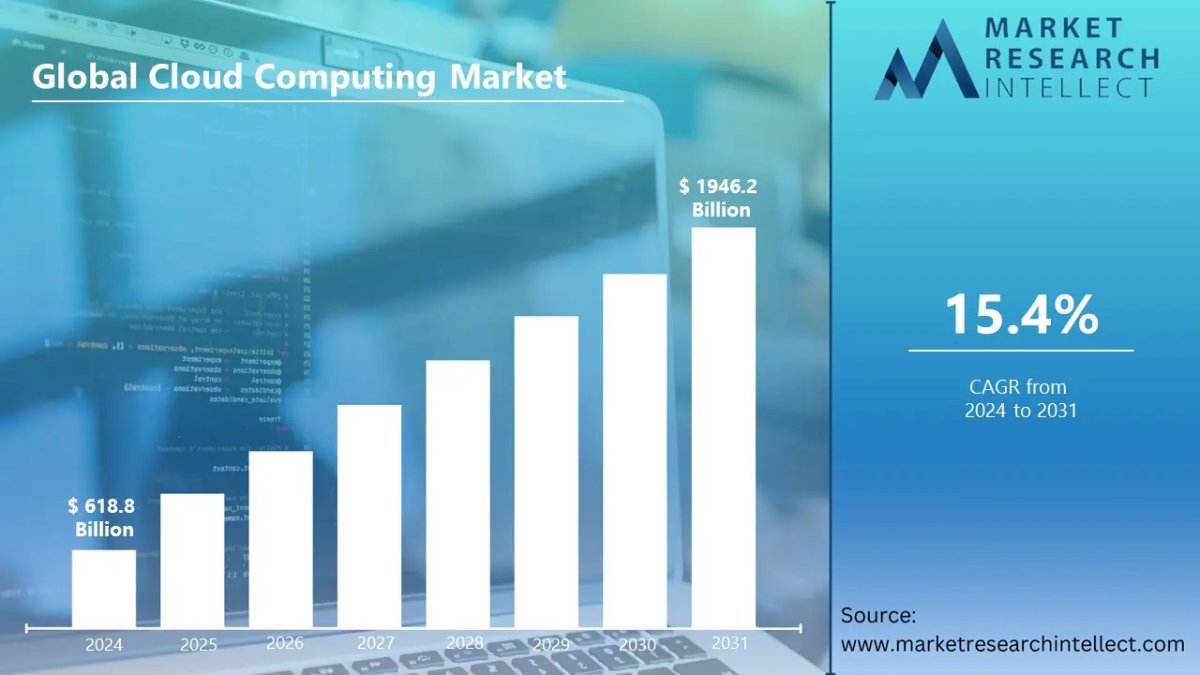Global Cloud Computing Market to Surge to $1946.2 Billion by 2031 with a Robust 15.4% CAGR
Published by Jessica Weisman-Pitts
Posted on September 6, 2024
7 min readLast updated: January 29, 2026

Published by Jessica Weisman-Pitts
Posted on September 6, 2024
7 min readLast updated: January 29, 2026

The global cloud computing market size is poised for substantial growth, projected to expand from USD 618.8 billion in 2023 to a substantial USD 1946.2 billion by 2031, demonstrating a robust Compound Annual Growth Rate (CAGR) of 15.4% during the forecast period.
The global cloud computing market size is poised for substantial growth, projected to expand from USD 618.8 billion in 2023 to a substantial USD 1946.2 billion by 2031, demonstrating a robust Compound Annual Growth Rate (CAGR) of 15.4% during the forecast period.
The cloud computing market in the education sector is experiencing robust growth, driven by the increasing adoption of digital learning platforms. Educational institutions are leveraging cloud-based solutions to enhance learning experiences, offering students and educators access to a plethora of resources and tools from any location. This shift is not only modernizing traditional teaching methods but also facilitating personalized learning, making education more accessible and inclusive. The integration of artificial intelligence and machine learning in cloud platforms is further enhancing the capabilities of educational tools, providing insights and analytics that drive better learning outcomes.
Key trends in the cloud computing in the education sector include the proliferation of e-learning platforms, virtual classrooms, and the adoption of hybrid learning models. The COVID-19 pandemic accelerated these trends, highlighting the need for resilient and flexible educational infrastructures. Institutions are increasingly investing in cloud-based learning management systems (LMS) and collaboration tools to support remote and hybrid learning environments. Additionally, there is a growing focus on cybersecurity and data privacy, as educational institutions handle vast amounts of sensitive data. This trend is driving the demand for secure cloud solutions that ensure compliance with regulations.
The growth of the cloud computing market in the education sector is also fueled by government initiatives and funding aimed at digital transformation in education. Governments across the globe are recognizing the potential of cloud computing to bridge educational gaps and are investing in infrastructure to support digital learning. Moreover, the affordability and scalability of cloud solutions make them an attractive option for educational institutions of all sizes. As technology continues to evolve, the education sector is expected to see further advancements in cloud computing, driving innovation and improving educational outcomes.
Drivers of the Cloud Computing in Education Sector Market
Restraints of the Cloud Computing in Education Sector Market
Key Players in the Cloud Computing in Education Sector Market
Segmentations of the Cloud Computing in Education Sector Market
By Type
By Application
By Geography
Education: E-Learning & Online Education
Education is a fundamental pillar of societal development, encompassing a wide range of activities aimed at acquiring knowledge, skills, values, and habits. It plays a crucial role in personal growth, economic prosperity, and social well-being. Modern education encompasses various forms, including formal, informal, and non-formal education, catering to diverse learning needs. In today’s digital age, technology has become an integral part of education, enhancing accessibility, and efficiency. E-learning and online education are prime examples of this transformation, providing flexible and scalable learning solutions. Additionally, emerging technologies like artificial intelligence and cloud computing are further revolutionizing the educational landscape, offering innovative ways to deliver and manage educational content. By integrating traditional teaching methods with cutting-edge technology, the education sector aims to create an inclusive and equitable learning environment for all.
E-learning and online education represent a transformative shift in how educational content is delivered and consumed. This subcategory encompasses various digital learning methods, including online courses, virtual classrooms, and interactive learning platforms. E-learning offers flexibility, allowing learners to access educational materials at their own pace and convenience, breaking geographical barriers. It supports diverse learning styles through multimedia content, quizzes, and interactive sessions, enhancing engagement and retention. The COVID-19 pandemic accelerated the adoption of online education, highlighting its potential to maintain continuity in learning despite physical constraints. With advancements in technology, e-learning platforms are increasingly incorporating features like artificial intelligence, personalized learning paths, and immersive experiences through augmented and virtual reality. This digital approach to education not only broadens access to quality education but also prepares learners for the demands of a tech-driven world.
Cloud computing is revolutionizing the education sector by providing scalable, cost-effective, and accessible technological solutions. It enables educational institutions to store vast amounts of data, access advanced software, and deliver digital learning materials without the need for significant on-premises infrastructure. Cloud-based platforms facilitate collaboration among students and educators, allowing real-time sharing of resources and interactive learning experiences. They support various educational applications, including learning management systems (LMS), virtual classrooms, and administrative tools, enhancing efficiency and effectiveness. Moreover, cloud computing ensures data security and disaster recovery, protecting valuable educational content. By leveraging cloud technology, educational institutions can offer personalized learning experiences, track student progress, and streamline administrative tasks, ultimately fostering a more dynamic and responsive educational environment.
About Us: Market Research Intellect
Market Research Intellect is a leading Global Research and Consulting firm servicing over 5000+ global clients. We provide advanced analytical research solutions while offering information-enriched research studies. We also offer insights into strategic and growth analyses and data necessary to achieve corporate goals and critical revenue decisions.
Our 250 Analysts and SMEs offer a high level of expertise in data collection and governance using industrial techniques to collect and analyze data on more than 25,000 high-impact and niche markets. Our analysts are trained to combine modern data collection techniques, superior research methodology, expertise, and years of collective experience to produce informative and accurate research.
Our research spans a multitude of industries including Energy, Technology, Manufacturing and Construction, Chemicals and Materials, Food and Beverages, etc. Having serviced many Fortune 2000 organizations, we bring a rich and reliable experience that covers all kinds of research needs.
For inquiries, Contact us at:
Mr. Edwyne Fernandes
Market Research Intellect
APAC: +61 485 860 968
EU: +44 788 886 6344
US: +1 743 222 5439
Cloud computing is the delivery of computing services over the internet, allowing users to access and store data on remote servers instead of local computers.
Digital transformation refers to the integration of digital technology into all areas of a business, fundamentally changing how it operates and delivers value to customers.
Cybersecurity involves protecting computer systems and networks from theft, damage, or unauthorized access, ensuring the confidentiality, integrity, and availability of data.
E-learning is the use of electronic technologies to access educational curriculum outside of a traditional classroom, often through online courses and virtual classrooms.
Data privacy refers to the handling and protection of personal data, ensuring that individuals' information is collected, stored, and used in compliance with regulations.
Explore more articles in the Research Reports category











